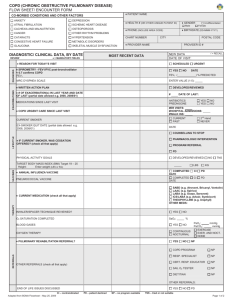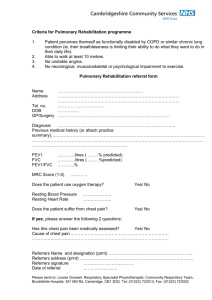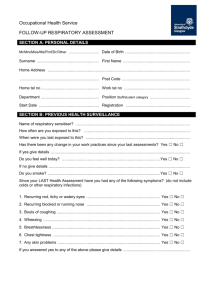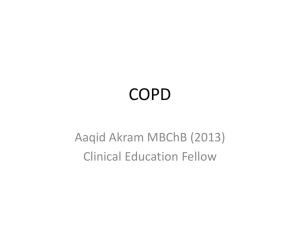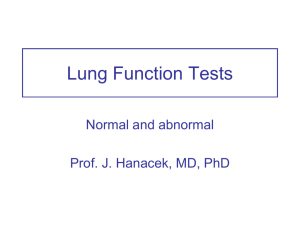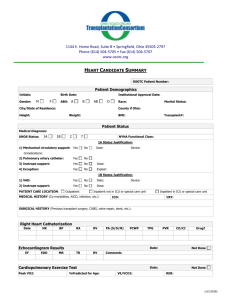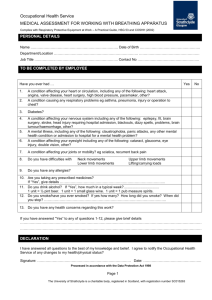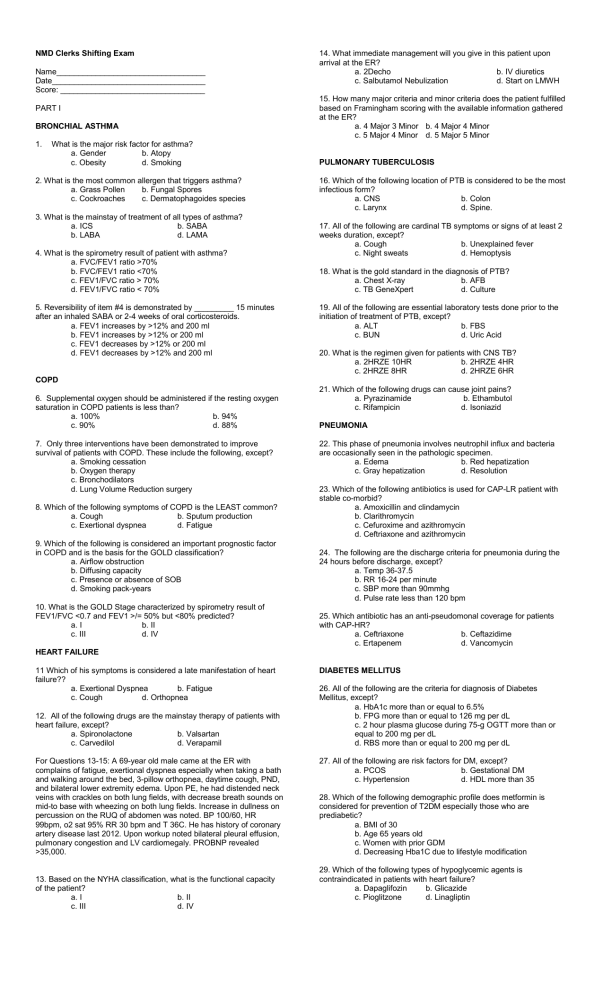
NMD Clerks Shifting Exam Name__________________________________ Date___________________________________ Score: _________________________________ PART I BRONCHIAL ASTHMA 1. What is the major risk factor for asthma? a. Gender b. Atopy c. Obesity d. Smoking 2. What is the most common allergen that triggers asthma? a. Grass Pollen b. Fungal Spores c. Cockroaches c. Dermatophagoides species 3. What is the mainstay of treatment of all types of asthma? a. ICS b. SABA b. LABA d. LAMA 4. What is the spirometry result of patient with asthma? a. FVC/FEV1 ratio >70% b. FVC/FEV1 ratio <70% c. FEV1/FVC ratio > 70% d. FEV1/FVC ratio < 70% 5. Reversibility of item #4 is demonstrated by _________ 15 minutes after an inhaled SABA or 2-4 weeks of oral corticosteroids. a. FEV1 increases by >12% and 200 ml b. FEV1 increases by >12% or 200 ml c. FEV1 decreases by >12% or 200 ml d. FEV1 decreases by >12% and 200 ml 14. What immediate management will you give in this patient upon arrival at the ER? a. 2Decho b. IV diuretics c. Salbutamol Nebulization d. Start on LMWH 15. How many major criteria and minor criteria does the patient fulfilled based on Framingham scoring with the available information gathered at the ER? a. 4 Major 3 Minor b. 4 Major 4 Minor c. 5 Major 4 Minor d. 5 Major 5 Minor PULMONARY TUBERCULOSIS 16. Which of the following location of PTB is considered to be the most infectious form? a. CNS b. Colon c. Larynx d. Spine. 17. All of the following are cardinal TB symptoms or signs of at least 2 weeks duration, except? a. Cough b. Unexplained fever c. Night sweats d. Hemoptysis 18. What is the gold standard in the diagnosis of PTB? a. Chest X-ray b. AFB c. TB GeneXpert d. Culture 19. All of the following are essential laboratory tests done prior to the initiation of treatment of PTB, except? a. ALT b. FBS c. BUN d. Uric Acid 20. What is the regimen given for patients with CNS TB? a. 2HRZE 10HR b. 2HRZE 4HR c. 2HRZE 8HR d. 2HRZE 6HR COPD 6. Supplemental oxygen should be administered if the resting oxygen saturation in COPD patients is less than? a. 100% b. 94% c. 90% d. 88% 7. Only three interventions have been demonstrated to improve survival of patients with COPD. These include the following, except? a. Smoking cessation b. Oxygen therapy c. Bronchodilators d. Lung Volume Reduction surgery 8. Which of the following symptoms of COPD is the LEAST common? a. Cough b. Sputum production c. Exertional dyspnea d. Fatigue 9. Which of the following is considered an important prognostic factor in COPD and is the basis for the GOLD classification? a. Airflow obstruction b. Diffusing capacity c. Presence or absence of SOB d. Smoking pack-years 10. What is the GOLD Stage characterized by spirometry result of FEV1/FVC <0.7 and FEV1 >/= 50% but <80% predicted? a. I b. II c. III d. IV 21. Which of the following drugs can cause joint pains? a. Pyrazinamide b. Ethambutol c. Rifampicin d. Isoniazid PNEUMONIA 22. This phase of pneumonia involves neutrophil influx and bacteria are occasionally seen in the pathologic specimen. a. Edema b. Red hepatization c. Gray hepatization d. Resolution 23. Which of the following antibiotics is used for CAP-LR patient with stable co-morbid? a. Amoxicillin and clindamycin b. Clarithromycin c. Cefuroxime and azithromycin d. Ceftriaxone and azithromycin 24. The following are the discharge criteria for pneumonia during the 24 hours before discharge, except? a. Temp 36-37.5 b. RR 16-24 per minute c. SBP more than 90mmhg d. Pulse rate less than 120 bpm 25. Which antibiotic has an anti-pseudomonal coverage for patients with CAP-HR? a. Ceftriaxone b. Ceftazidime c. Ertapenem d. Vancomycin HEART FAILURE 11 Which of his symptoms is considered a late manifestation of heart failure?? a. Exertional Dyspnea b. Fatigue c. Cough d. Orthopnea 12. All of the following drugs are the mainstay therapy of patients with heart failure, except? a. Spironolactone b. Valsartan c. Carvedilol d. Verapamil For Questions 13-15: A 69-year old male came at the ER with complains of fatigue, exertional dyspnea especially when taking a bath and walking around the bed, 3-pillow orthopnea, daytime cough, PND, and bilateral lower extremity edema. Upon PE, he had distended neck veins with crackles on both lung fields, with decrease breath sounds on mid-to base with wheezing on both lung fields. Increase in dullness on percussion on the RUQ of abdomen was noted. BP 100/60, HR 99bpm, o2 sat 95% RR 30 bpm and T 36C. He has history of coronary artery disease last 2012. Upon workup noted bilateral pleural effusion, pulmonary congestion and LV cardiomegaly. PROBNP revealed >35,000. 13. Based on the NYHA classification, what is the functional capacity of the patient? a. I b. II c. III d. IV DIABETES MELLITUS 26. All of the following are the criteria for diagnosis of Diabetes Mellitus, except? a. HbA1c more than or equal to 6.5% b. FPG more than or equal to 126 mg per dL c. 2 hour plasma glucose during 75-g OGTT more than or equal to 200 mg per dL d. RBS more than or equal to 200 mg per dL 27. All of the following are risk factors for DM, except? a. PCOS b. Gestational DM c. Hypertension d. HDL more than 35 28. Which of the following demographic profile does metformin is considered for prevention of T2DM especially those who are prediabetic? a. BMI of 30 b. Age 65 years old c. Women with prior GDM d. Decreasing Hba1C due to lifestyle modification 29. Which of the following types of hypoglycemic agents is contraindicated in patients with heart failure? a. Dapaglifozin b. Glicazide c. Pioglitzone d. Linagliptin 30. All of the following hypoglycemic agent can promote weight loss, except? a. Insulin b. Biguanides c. GLP 1 receptor antagonists d. Alpha-glucosidase inhibitors HYPERTENSION 40. All of the following are first line agents for hypertension, except? a. Losartan b. Carvedilol c. Amlodipine d. Hydrochlorothiazide Part II Give the generic name of the following drugs: 41. Symbicort _______________________ 42. Berodual _______________________ 43. Lipitor _______________________ 44. Jardiance _______________________ 45. Norvasc _______________________ 46. Atenurix _______________________ 47. Augmentin _______________________ 48. Monurol _______________________ 49. Glucophage _______________________ 50. Dolcet _______________________
